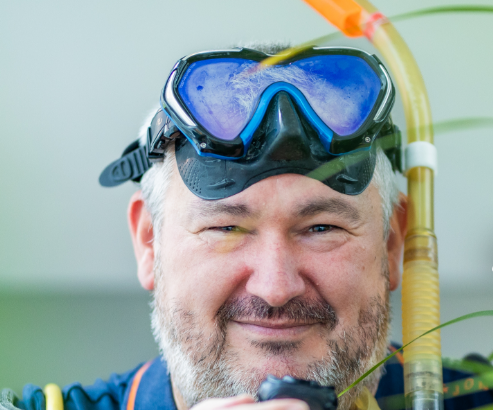Never without… my scuba gear!

When Bart De Clerck is not on call for Datacom, he ventures at least once a week into the fascinating world of the deep.
“As a child, I was fascinated by the documentaries of Captain Cousteau, who explored marine fauna and flora with his boat, the Calypso. When I was older, I wanted to discover all this for myself but I didn’t know where to start. When I joined Elia about 25 years ago, a colleague, now retired, introduced me to diving.”
Weightless
“Diving is a real relWhen you’re diving, you have to be fully focused on axation session for me. The stress of everyday life disappears completely. what you’re doing. So I completely forget about work. Nothing is more beautiful than moving underwater, all in lightness, with that feeling of freedom and being able to go wherever you want.
I dive once or twice a week… if I’m not on call for Datacom 😉. Once a year, I go abroad: to Egypt, or to the Indonesian island of Sulawesi. It is a real paradise for divers, with an incredible number of species. I’ve already seen some strange specimens myself!”
Checklist
“Diving is obviously not without risk. In a dangerous situation, you have to stay calm, breathe slowly and focus on what you’re doing, otherwise it can quickly go wrong. It is essential to rigorously review your checklist before diving. Is there enough oxygen? Does the equipment work perfectly? Do I have my diving light? Etc.
I also use this kind of checklist in my work at the Data Transmission Network Operations Center or DTNOC. We manage data transmission to high-voltage substations to support services such as telephony, VoIP (Internet calling), high-voltage line protection, metering, Remote Terminal Units (RTUs) and video surveillance. We are also in charge of data flows between data centres and service centres. We are a bit like Elia’s Proximus. We use the same technology as the big telecoms operators, but on a smaller scale.”
Fibre optics throughout Belgium
“When I started working here and our service was still called Telecom, a lot of telecommunications was analogue. Among other things, we worked with modems and their characteristic sounds. Since then, data transmission has become much more complex. While the bandwidth was 56 kB per second at the time, today it is 400 GB. Data transmission has also expanded widely. Before, we had copper and fibre optic cables in a limited number of locations and the amount of ancillary services was relatively limited.
Today, there are fibre optic cables all over the country, with all the management that this represents. We need to anticipate road works. To make sure I don’t forget anything, I always use a checklist. Have we taken the necessary security measures? Have everyone involved been informed? If there’s a problem, like an excavator cutting a cable, it’s like when I’m diving: stay calm and focused to find the right solution.
Cables are being used for more and more datacom networks and support an increasing number of services. The challenges associated with managing all these networks and services have increased tremendously in recent years. The criticality of our function has also developed over time. For this reason, DTNOC has grown significantly and professionalised further in recent years.”
Passing on your knowledge
“As a technician at heart, this job suits me perfectly. I learn every day and work with cutting-edge technologies. In the meantime, I have become the veteran of the team. That’s one of the good things about my job: I can pass on my knowledge to younger people or external collaborators.
I also share my diving experience. I became an instructor in 2008 and since 2012 I have also been training instructors. I really enjoy seeing people grow during their training!”